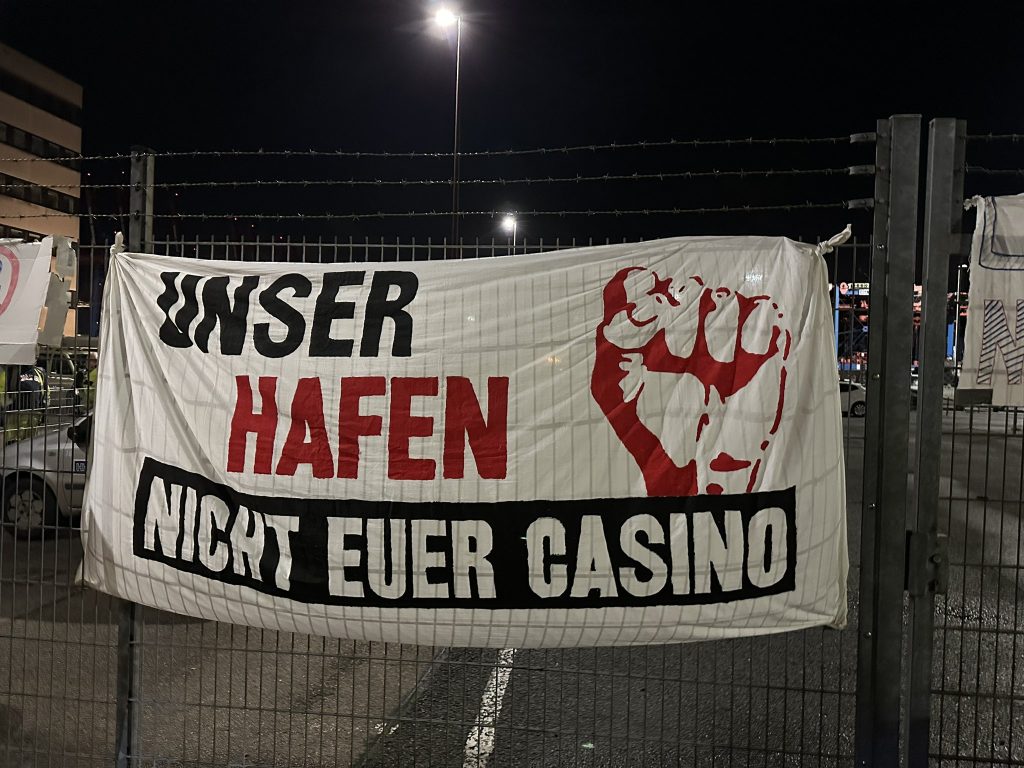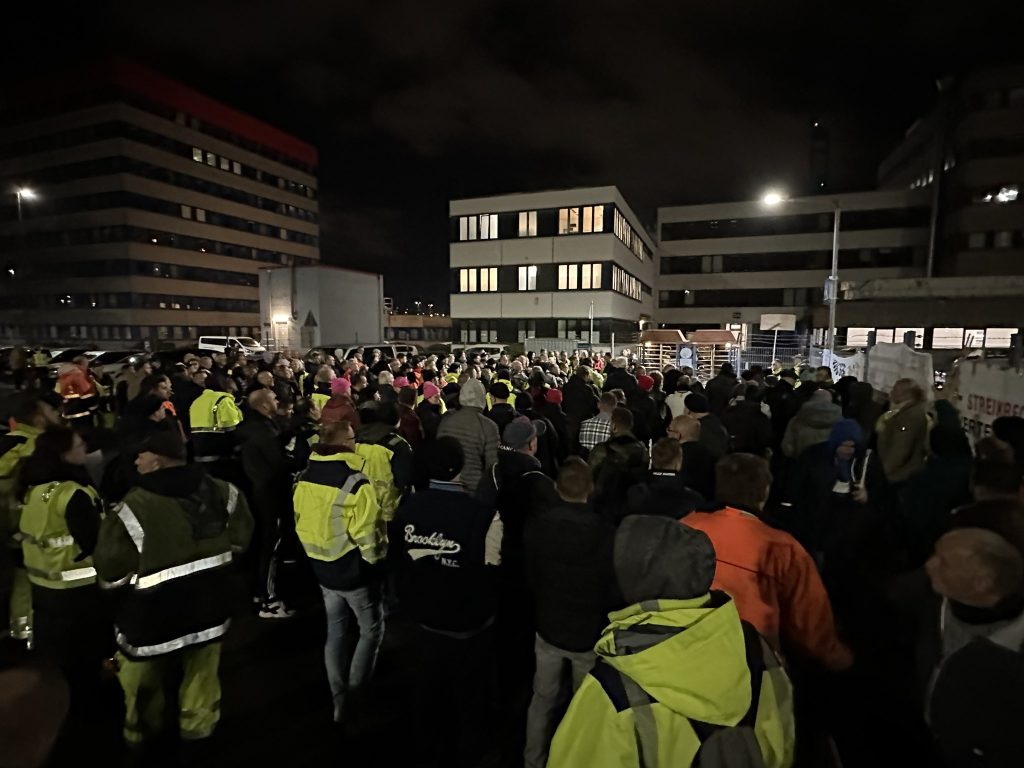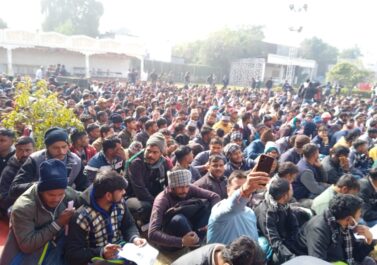
(translation of an article by comrades from Wildcat, Germany)
Yesterday, on the 6th of November 2023, the Executive and Supervisory Board of Hamburger Hafen und Logistik AG (HHLA – the Hamburg port authority) officially voted in favor of the partial sale of the port to the world’s largest shipping company, the Mediterranean Shipping Company (MSC). This sell-out is directed against the power of port workers and worsens their working conditions. Privatization is intended to undermine workers’ representation when it comes to managing the port and break the resistance against automation, job cuts and cost reductions.
Yesterday afternoon, almost the entire afternoon shift of around 200 workers at the Burchardkai container terminal went on wildcat strike. The following night shift and the early shift continued the strike – as of the 7th of November, 6 p.m., the strike is in its fourth shift. Workers at the other two terminals (Tollerort and Altenwerder) perform slowdowns.
On the 8th of November an assembly decided during the night-shift to suspend the strike after management had sent out the first disciplinary letters and a few colleagues called in sick. To continue the slow-down at work seems to limit the risk of repression.
On the 11th of November at 11am, the trade union Verdi organises a demonstration against the sale of the port shares at the Rathausplatz.
Here is our article from the current Wildcat 112, Fall 2023.

Automation attack in the port of Hamburg – Assessment by a port worker
The 2022 round of collective bargaining
The mood at last year’s meetings to prepare the strike mobilizations for the 2022 collective bargaining round was combative. On the one hand, workers received only moderate wage settlements in the previous years, but saw, on the other hand, gigantic profits for shipowners and extra profits for terminals as a result of disrupted supply chains. The demand was: compensation for inflation plus a wage increase of up to 14 percent, depending on the wage group.
The headline in the German yellow press BILD: “Greed on the pier” started a smear campaign that was picked up by the rest of the media. All this further inflamed the mood. Colleagues began to work more slowly and refuse to work overtime. Short films about this appeared on social media. The trade union also issued a leaflet calling on people to work calmly.
As a result, entire ships could not be processed, and a COSCO ship loaded with 24,000 containers lay on the quay for 24 hours without moving a container. This had never happened before on this scale.
Warning strikes followed. The first showed determination. The colleagues not only demonstrated in front of the port warehouses, but also went out and blocked a central intersection in the port. When the police tried to clear the area, physical confrontations broke out. The second demonstration also had a militant character and there were also clashes with the police.
The whole thing had taken on a dynamic that the union leadership certainly did not want.
Completely surprisingly for everyone, the union conjured up a court settlement with the employers, which suspended the warning strikes for a period of two weeks with three further rounds of negotiations. No port worker understood this, but everyone accepted it somehow. After the turbulent days, confidence in the union was high, and there were also militant colleagues on the bargaining committee.
As a result, the momentum flattened out and fewer and fewer people came to support demonstrations during the negotiation rounds. The third day of negotiations ended with a result that was hardly any better than the previous one. But the vast majority were satisfied with what had been achieved and wanted to return to normality. There were, of course, many who questioned the deal, and there was also a lot of criticism in the social media, but there was no driving force. It remained the usual discussions: “one would have to, but…”. One problem is that the radical forces are too involved in the various official union and works council committees and do not act independently. For more on the 2022 strike, see the report and interview in Wildcat 110.
Have these experiences strengthened us for the upcoming battles?
For 15 years, HHLA has been working on converting the largest terminal, Burchardkai, from straddle carriers to a block storage facility with gantry cranes. [1] The work will be completed in 2024, and from then on, the straddle carriers , which are currently moved by drivers, will be replaced by automated vehicles. The aim is to cut 500 jobs and significantly expand the storage area for containers.
In addition to the private quay Eurogate, there are currently three terminals in the Port of Hamburg that belong to HHLA:
- Burchardkai
- Tollerort (in which COSCO was allowed to acquire a 24.9 percent share in 2022)
- Altenwerder (state-of-the-art container handling)
Part of the conversion is that the world’s largest shipping company MSC is to acquire 49.9 percent of HHLA’s shares, which are currently largely owned by the City of Hamburg. In order to implement all this, the independent terminals are to be dissolved and merged into four new operations:
- The port workers will then belong to the “Container Handling” operation,
- the technicians in the workshops to the “Technology” company,
- ship planners, dispatchers and schedulers to the “Planning and Administration” operation
- and the “Terminal Development” operation will then house IT.
This means that the old works councils of the individual terminals will be dissolved and all agreements will have to be renegotiated. HHLA’s political objective is clear: it wants newly composed works councils in which the power of the Burchardkai works councils is no longer so strong and more management-friendly works councils gain influence. In this way, they hope to conclude as many agreements as possible that take the collective contract of the Altenwerder container terminal as a reference point – which is worse in terms of working conditions. There is a new collective agreement there that is not typical for the port, and the work is more intensive due to the many automated processes.
But instead of fulfilling the dreams of the management consultants, this could also lead to an even stronger workforce united in one company that will not allow poor conditions to be dictated.
While this battle over restructuring is still open, HHLA is on the home straight with the automation of Burchardkai. There are agreements to cut 500 jobs through partial retirement arrangements, i.e. the old, experienced workers are being bought out. [2]
The “automation during ongoing operations” project is devouring huge sums of money. None of the schedules have even come close to being met. The last test of a software changeover that had been planned for years ended in disaster.
Automation does not increase container productivity on the ship. But replacing straddle carrier drivers with automated vehicles makes it possible to regain control over work processes. This takes away an important power factor from the port workers. Of the four jobs per section with the most power, three (!) will be lost. The scope for self-organized go-slow actions becomes very small. Of course, the high wages will also be cut and the general working times expanded towards a 24/7 operation.
HHLA expects automation to result in significant volume growth. This wishful thinking is not underpinned by any economic forecast. If container handling continues to stagnate as it has over the last ten years, up to 400 more jobs will have to be cut.
The whole thing is being covered up by the media discussion about the COSCO and MSC shareholdings in HHLA and the apparently fierce competition from the much more productive, because much more automated, ports of Rotterdam and Antwerp. In reality, the employers are using the current lull to use privatization as a means of removing the workers’ collective discontent and behaviour (in the media, this means: uncompetitive costs per container) and preparing the ground for further automation.
There was an angry demonstration against privatization on the 19th of September with 2,000 people – past the German headquarters of MSC to the town hall. The cops’ cordon was cleared away, and firecrackers and fireworks were set off in the town hall square. The slogans: “Our port, not your casino!” and “Mafia Shipping Company”.
The union is demanding a four-day week with full pay compensation in order to save as many port jobs as possible. This demand, which does not oppose the automation plans, is currently gaining momentum. The 35-hour week with full pay compensation in the form of an additional 30 days off was fought for 30 years ago, so that the four-day week would be achieved with 15 additional days off.
Footnotes
[1] Advertising film: https://hhla.de/magazin/blocklager
[2] In the mid-noughties, there were major disputes in the port of Hamburg. We reported on this briefly at the time: Wildcat 69: Port of Hamburg – wage cuts by collective agreement, spring 2004



